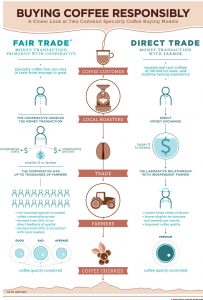
https://www.birdrockcoffee.com/
Many college students may feel disconnected with the topic of trade because of their perceived inability to influence it. However, our project demonstrates that there are many ways, in which students can get involved locally to influence this global issue. Specifically, we utilized a forum in the format of a podcast to proliferate the knowledge we gained in our discussions with local experts on trade. The two speakers we invited to this podcast were the president of the Washington Fair Trade Coalition, Stan Sorscher and coffee education head at University of Washington, Joseph Maurey. One of the many outcomes of this podcast was that it highlighted a reoccurring theme in our class, which is the unfair treatment of third world countries in the global food system. We primarily focused on the coffee industry, which is very integral to Seattle and discussed that coffee beans would be much more expensive if we didn’t exploit countries like Brazil for cheap land and labor. Unfortunately, these individuals get paid very cheaply so that consumers in more affluent countries can enjoy cheaper coffee prices. In addition to the topic of coffee, the president of the Washington Fair Trade Coalition talked to us about how to negotiate trade agreements that are more fair and beneficial for both parties. This was extremely fascinating because our class frequently talked about how unfair trade agreements produced predatory practices like land grabbing which would in turn diminish the food security of these third world countries. However, our speaker thought that the Paris climate change negotiations could be used as a model for better deals in that using transparency, more defined political frameworks, and negotiating selectively by interests would remedy this. Students listening to our podcast, at minimum should take away the notion that we are ultimately accountable for driving these predatory practices and we must be more cognizant of making sure our food purchases don’t support this. Furthermore, we should individually strive to purchase food items from companies with fair and sustainable trade practices, which will help establish norms regulating the global food market. We hope that this podcast will proliferate this information and serve as a catalyst that will drive our fellow University of Washington students to get involved in supporting fair trade more rigorously.
Here is our website, which holds the audio recording:
https://scheckj5.wixsite.com/piggybank
